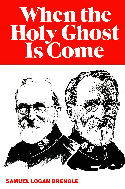The Lamsa Bible (translated from Peshitta)
The Lamsa Bible 1933
This translation of the Old and New Testaments is based on Peshitta manuscripts which have comprised the accepted Bible of all those Christians who have used Syriac as their language of prayer and worship for many centuries. Syriac is the literary dialect of Aramaic. From the Mediterranean east into India, the Peshitta is still the Bible of preference among Christians. George M. Lamsa, the translator, devoted the major part of his life to this work. He was an Assyrian and a native of ancient Bible lands. He and his people retained Biblical customs and Semitic culture, which had perished elsewhere. With this background and his knowledge of the Aramaic (Syriac) language, he has recovered much of the meaning that has been lost in other translations of the Scriptures. Manuscripts used were the Codex Ambrosianus for the Old Testament and the Mortimer-McCawley manuscript for the New Testament. Comparisons have been made with other Peshitta manuscripts, including the oldest dated manuscript in existence. The term Peshitta means straight, simple, sincere and true, that is, the original. Even the Moslems in the Middle East accept and revere the Peshitta text. Although the Peshitta Old Testament contains the Books of the Apocrypha, this edition has omitted them.
George M. Lamsa- The Holy Bible From the Ancient Eastern Text (1933)- The only complete English translation of both the Old and New Testaments according to the Peshitta text. Lamsa was a native Syriac speaker. This translation is better known as the Lamsa Bible. He also wrote several other books on the Peshitta and Aramaic Primacy such as Gospel Light, New Testament Origin, and Idioms of the Bible, along with a New Testament commentary. Several well-known evangelists used or endorsed the Lamsa Bible, such as Oral Roberts, Billy Graham, and William M. Branham.

Brengle When the Holy Ghost is Come is from the Salvation Army tradition, and Brengle was part of the Deeper Life Movement.
Downloads
theWord:Brengle When the Holy Ghost is Come
MySword:Brengle When the Holy Ghost is Come
PDF:Brengle When the Holy Ghost is Come
eSword:Brengle When the Holy Ghost is Come
Advertisement
In this class, Finding theWord modules quickly, I will walk you through how to quickly find a particular module in the theWord interface.
